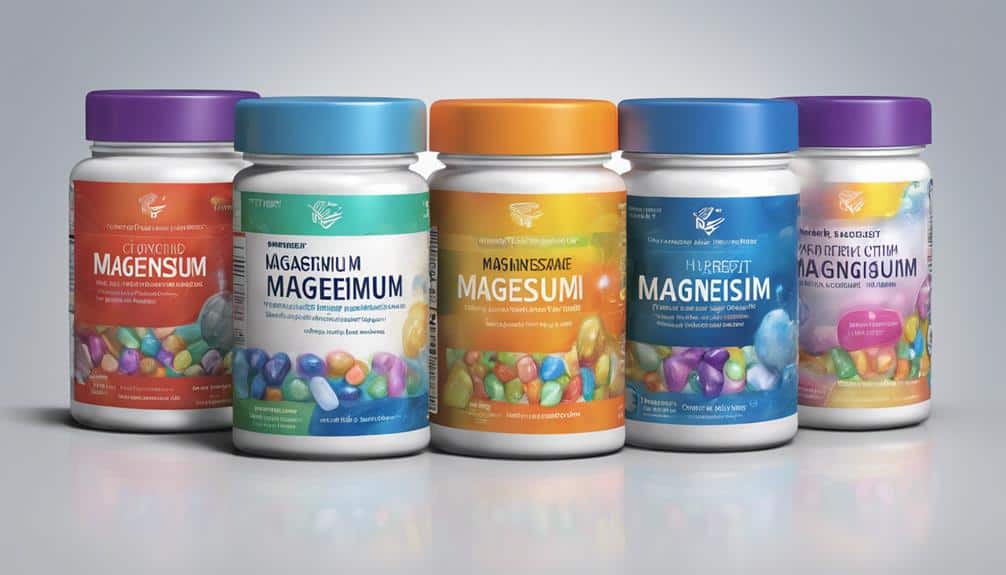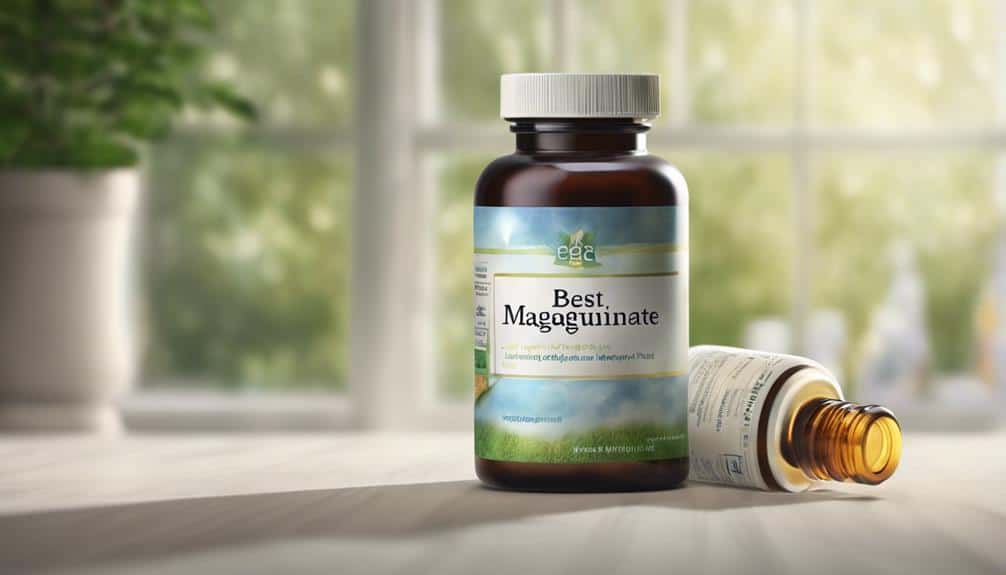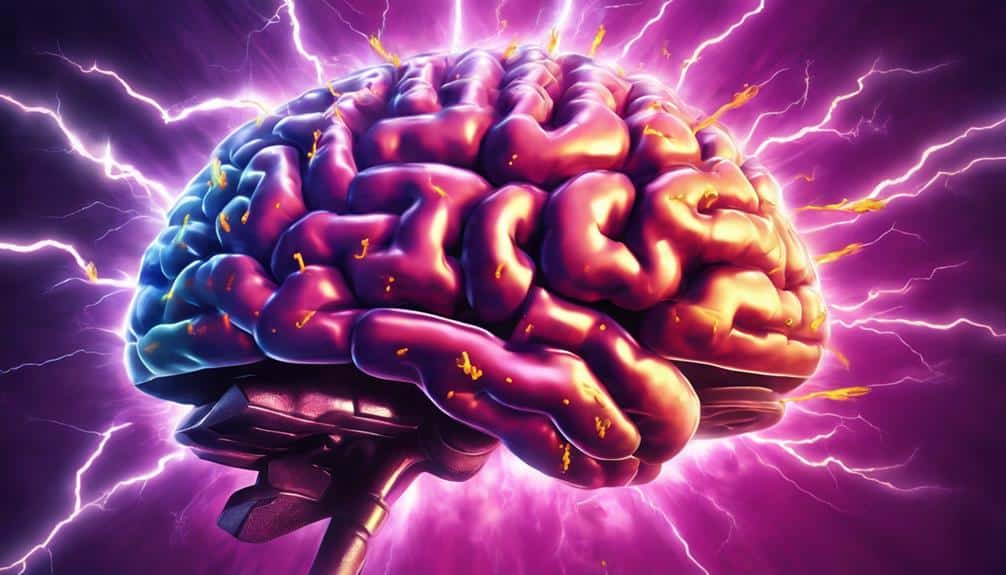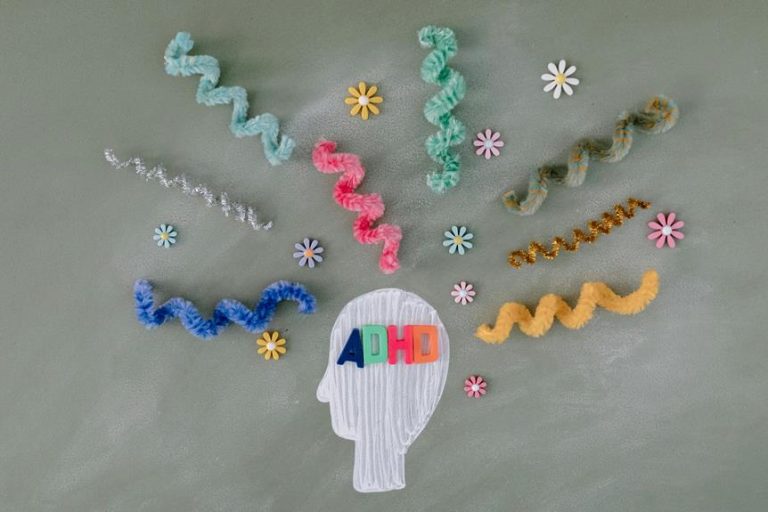Best Magnesium for Adhd
Personally, pondering the plethora of magnesium options for ADHD management prompts a practical pursuit of the perfect pick.
With diverse forms like L-Threonate and citrate gaining recognition, the quest for the most effective magnesium supplement can be perplexing.
However, understanding the nuances between various types and their impact on ADHD symptoms can lead to a more informed decision.
Key Takeaways
- Magnesium Glycinate: Calming, cognitive support, anxiety relief.
- Magnesium Citrate: Gut health, focus improvement, anxiety reduction.
- Magnesium Taurate: Concentration, heart health, calming effects.
- Consider Absorbable Forms: Evaluate benefits for individual needs.
Types of Magnesium for ADHD

When considering the best magnesium for managing ADHD symptoms, various types, each with unique benefits, can be explored. Magnesium Glycinate is known for its high bioavailability, making it an excellent choice for individuals seeking calming effects and relief from anxiety symptoms. On the other hand, Magnesium L-Threonate stands out for its ability to cross the blood-brain barrier, enhancing cognitive function which could be beneficial for individuals with ADHD.
Magnesium Citrate, known for its constipation-relieving properties, also plays a role in improving gut health, which is essential for overall well-being. It may indirectly benefit ADHD symptoms by promoting a healthy gut-brain connection.
Additionally, Magnesium Taurate is recommended for individuals with cardiovascular issues due to its support for heart health and cardiovascular function. While it may not directly impact ADHD symptoms, maintaining heart health is vital for overall wellness and may indirectly support cognitive function.
Each type of magnesium offers unique advantages that could potentially aid in managing ADHD symptoms, either directly or indirectly.
Best Magnesium Glycinate for ADHD

Magnesium Glycinate emerges as the best choice for managing ADHD symptoms due to its high absorbability, gentle impact on the stomach, and profound calming effects on the nervous system. This form of magnesium is particularly beneficial for individuals with ADHD as it not only supports cognitive function but also aids in reducing anxiety levels and promoting relaxation.
The calming effects of Magnesium Glycinate on the nervous system can help improve focus and concentration, which are often areas of difficulty for individuals with ADHD. It's recommended for ADHD management due to its effectiveness in addressing these specific challenges.
Additionally, individuals with ADHD may require higher doses of Magnesium Glycinate to experience optimal benefits, as this form of magnesium is well-tolerated and easily absorbed, making it a valuable supplement for those seeking to alleviate ADHD symptoms and enhance overall cognitive function.
Top Magnesium Citrate Supplements

I'll start by highlighting the benefits of magnesium citrate:
Magnesium citrate is a well-absorbed form of magnesium that can aid in relieving constipation and promoting gut health, important factors for those managing ADHD symptoms.
Providing dosage recommendations for individuals with ADHD:
Understanding the advantages of magnesium citrate and the appropriate dosages can help individuals make informed choices when selecting supplements for ADHD management.
Benefits of Citrate
Citrate supplements rich in magnesium offer a highly absorbable and beneficial form of the mineral, particularly effective for managing ADHD symptoms. Magnesium citrate can help improve focus, reduce anxiety, and promote relaxation in individuals with ADHD. Additionally, this form of magnesium supports gut health and can alleviate constipation issues commonly associated with ADHD.
Dosage Recommendations
When determining the appropriate dosage of magnesium citrate supplements, it's important to take into account individual factors such as age, gender, and specific health needs. To optimize the benefits for managing ADHD symptoms, consulting a healthcare professional is essential in establishing the best dosage. Here are key points to keep in mind:
- Age and Gender: Adults may require higher doses of magnesium citrate compared to children due to varying nutritional needs.
- Product Label Guidelines: Dosage recommendations for magnesium citrate are typically provided on the product label, serving as a useful starting point.
- Avoiding Side Effects: Ensuring the proper dosage of magnesium citrate is vital in preventing potential side effects while maximizing its efficacy in ADHD management.
Consulting with a healthcare provider can help tailor the dosage to individual requirements for the most effective results.
Magnesium Taurate Benefits for ADHD

I find that Magnesium Taurate offers promising benefits for individuals with ADHD.
It can potentially improve focus and concentration, while also providing calming effects on behavior.
These aspects make it a valuable supplement to contemplate for managing ADHD symptoms effectively.
Improved Focus and Concentration
For individuals with ADHD seeking to enhance their focus and concentration, Magnesium Taurate stands out as a promising solution due to its calming properties and support for heart health. This form of magnesium has been shown to reduce anxiety, promote relaxation, and support neurotransmitter function, all of which contribute to improved focus and concentration in individuals with ADHD.
Additionally, Magnesium Taurate is particularly beneficial for those with cardiovascular issues, making it a versatile option for managing both ADHD symptoms and heart health. By helping to regulate nerve impulses and balance mood, this form of magnesium can also aid in reducing hyperactivity and impulsivity commonly associated with ADHD.
Calming Effects on Behavior
Magnesium Taurate's calming effects on behavior make it a vital asset in managing symptoms of ADHD, particularly in promoting balanced behavior and reducing hyperactivity and impulsivity. This specific form of magnesium contains taurine, which aids in calming the nervous system, leading to improved behavior management in individuals with ADHD.
Additionally, Magnesium Taurate supports heart health, making it a suitable option for those with cardiovascular concerns alongside ADHD. By incorporating Magnesium Taurate into a supplement routine, individuals may experience a reduction in hyperactivity and impulsivity, contributing to enhanced mood and emotional well-being.
These calming properties play an important role in fostering better behavior control and overall well-being in individuals dealing with ADHD symptoms.
Choosing Magnesium Oxide for ADHD

When considering supplements for managing ADHD, individuals may find that Magnesium Oxide, while less absorbed in the body, has specific benefits for conditions such as migraines and constipation.
- Less Absorbed: Magnesium Oxide has a lower absorption rate compared to other forms of magnesium, making it less essential for addressing cognitive function and mood regulation in ADHD management.
- Suitable for Specific Health Issues: Despite its lower absorption rate, Magnesium Oxide can be beneficial for individuals dealing with migraines and constipation due to its targeted effects on these conditions.
- Consider Other Forms: Individuals with ADHD may benefit more from highly absorbable forms like Magnesium Glycinate or Magnesium L-Threonate, which are better suited for supporting cognitive function and mood regulation in ADHD management.
When choosing a magnesium supplement for ADHD, it's important to weigh the pros and cons of each form, considering factors such as absorption rates and the specific health needs of the individual.
Epsom Salts and ADHD Management

Epsom salts, containing magnesium sulfate that can be absorbed through the skin in a bath, offer a potential avenue for managing ADHD symptoms. Limited research suggests that Epsom salt baths may help relax muscles and improve sleep quality, which can be particularly beneficial for individuals with ADHD. The calming effects of Epsom salts can promote relaxation, potentially aiding in ADHD management. Incorporating Epsom salt baths into a daily routine is easy and may provide a natural way to support ADHD symptoms.
It is essential to note that while Epsom salt baths are generally considered safe, individuals should consult healthcare professionals before using them specifically for managing ADHD. This precaution guarantees that the use of Epsom salts aligns with an individual's overall treatment plan and health needs. By incorporating Epsom salt baths safely and effectively, individuals with ADHD may explore a complementary method to promote relaxation and potentially alleviate some symptoms.
Magnesium Creams for ADHD

The topical application of magnesium creams provides a convenient and effective method for individuals managing ADHD symptoms.
When considering magnesium creams for ADHD, there are several key points to keep in mind:
- Alternative Application: Magnesium creams offer an alternative way to supplement magnesium for individuals who struggle with oral intake, providing a practical solution for those with sensory sensitivities or swallowing difficulties.
- Topical Absorption: By applying magnesium creams directly to the skin, the magnesium is absorbed transdermally, allowing for targeted delivery to specific areas and potentially enhancing absorption compared to oral supplementation.
- Soothing Relaxation and Improved Focus: Many users report that magnesium creams have a soothing effect on the skin, promoting relaxation and potentially aiding in improving focus and attention, making them a beneficial option for individuals managing ADHD symptoms.
Frequently Asked Questions
What Type of Magnesium Should I Take for Adhd?
For ADHD treatment, consider various magnesium types like L-Threonate, Citrate, Glycinate, and Taurate. These supplements offer benefits for brain health, mental focus, and cognitive function. They provide nutritional support, aiding in managing ADHD symptoms effectively.
What Is the Best Form of Magnesium for Focus?
Ironically, when it comes to focus, magnesium glycinate and citrate are my go-tos. These forms enhance cognitive function, attention span, and mental clarity. They provide neurological benefits, support brain health, aid memory retention, and boost executive function.
What Is the #1 Supplement Helpful for Adhd?
As someone managing ADHD, I find that incorporating natural alternatives, dietary changes, and lifestyle modifications, along with herbal remedies and cognitive exercises, have been beneficial. These strategies, along with nutritional support, help me navigate ADHD challenges effectively.
Do ADHD Meds Deplete Magnesium?
Yes, ADHD medications can deplete magnesium levels, affecting cognitive function and mood regulation. Monitoring magnesium levels is essential for managing ADHD symptoms. Dietary sources and supplementation can help maintain ideal levels and support mental health.
Conclusion
To sum up, finding the best magnesium supplement for managing ADHD symptoms is essential for improved cognition, mood, and anxiety.
From magnesium L-Threonate to magnesium citrate, the options are plentiful. Consider the benefits of each type and choose one that suits your needs best.
With the right magnesium supplement, you can enhance your ADHD management plan and experience noticeable improvements in your overall well-being.
Choose wisely and see the difference for yourself.







